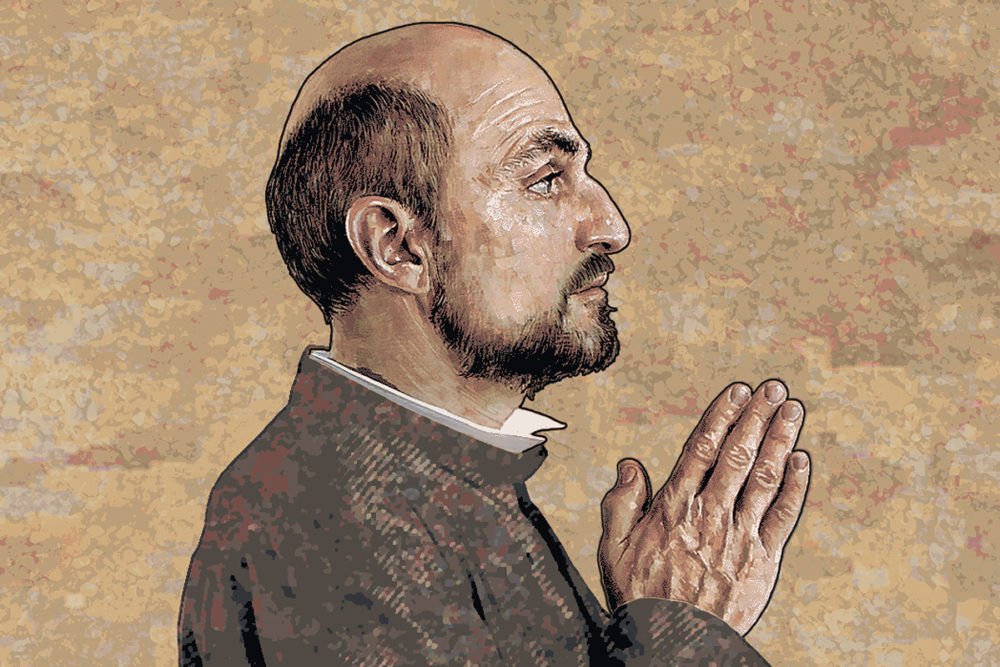
MISSION AND MINISTRY | Reading made the man. Then the man became a saint.
During his months-long convalescence, Ignatius could find none of the tales of chivalry that he loved to read. In some desperation he turned to the only literature at hand – the lives of the saints in “The Golden Legend,” by Jacopo da Voragine, and the “Life of Christ” by Ludolph of Saxony, both translated into Castilian. He read, contemplated and Ignatius became convinced that he wanted to live a holy existence.
Ignatius’ resulting life dedicated to God and the church will be marked with the Feast of St. Ignatius on July 31, 2019, at Sacred Heart Chapel. President Timothy Law Snyder has invited the LMU community to join in this celebration, which will include Allan Deck, S.J., as presider, and Ramesh Vanan Aravanan, S.J., M.F.A. ’19, as the homilist. A festive lunch will follow in Sculpture Garden. RSVPs are requested by Tuesday, July 30, 2019.
“In many ways, the annual Feast of St. Ignatius serves as a nice precursor to the inauguration of new academic year,” said Marc Reeves, S.J., associate vice president for mission and ministry. “The celebration of this feast invites students, faculty and staff to build and strengthen our sense of community on campus and reminds us of the Ignatian and Jesuit ideals grounded in academic excellence, the value of faith, the promotion of justice, a desire to accompany young people in the creation of a hope-filled future, and the protection and renewal of the planet.”
St. Ignatius Loyola was a central figure in the founding of the Society of Jesus, but it was not just Ignatius. From its earliest beginnings, the Society of Jesus was a corporate enterprise. Fundamentally, St. Ignatius and his first companions set out to “help souls.” Above everything else, they wanted to help people achieve an ever-better relationship with God. Yet, as the first elected general superior of the Society of Jesus, Ignatius Loyola did offer something that other religious orders did not have, namely the “Spiritual Exercises.”
What made the exercises special was not particular themes or their mode of articulation, according to “The First Jesuits,” by John W. O’Malley, S.J. It was, rather, the coordination of the parts into an integral and novel totality. Although the practice of spending a period of time alone in contemplation is older than Christianity itself, no effective codification of a way of doing so existed until the exercises – surely, none that had such clear design and movement. The book in effect created the institution known as the retreat, and in that creation lay its primary originality. Besides its many other influences on the first Jesuits, it handed them an instrument of ministry that was new and peculiar to them.
Besides the “Spiritual Exercises,” what particularly distinguished the Jesuits was their schools. Under St. Ignatius’ leadership, the Jesuits became the first religious order in the Catholic Church to undertake formal education as a major ministry. By 1773, the Society of Jesus was operating more than 800 universities, seminaries, and especially secondary schools almost around the globe, according to O’Malley. The Jesuits were the first religious order to undertake systematically, as a primary and self-standing ministry, the operation of full-fledged schools.
The inspiration for hundreds of universities and tens of thousands of students, Ignatius was a soldier turned priest and theologian. The biography on Jesuits.org says:
“One other thing to know about the Jesuit founder is that he was a different kind of saint. As the noted Jesuit historian John W. O’Malley, S.J., has observed, ‘Ignatius redefined the traditional basis of saintliness,’ which usually involved a degree of unworldliness.
In contrast, O’Malley refers to Ignatius as a ‘worldly saint.’ He made sure his men were spending most of their time not in pulpits and confessionals, but in relatively secular spaces such as classrooms — teaching less directly about the Bible and Church doctrine than about literature and the ancient classics. He sent letters to his missionaries asking that they write back not just about their ministries, but also about the local customs, the plants and wildlife — ‘anything that seems extraordinary.’
Most of all, Ignatius Loyola wanted his Jesuits and everyone to go out and ‘find God in all things.’ He died in 1556 — on July 31, his feast day in the Catholic Church.”
Photo Credit:
Communion of Saints
Used with Permission, Copyright 2003
John Nava/The Cathedral of Our Lady of the Angels



